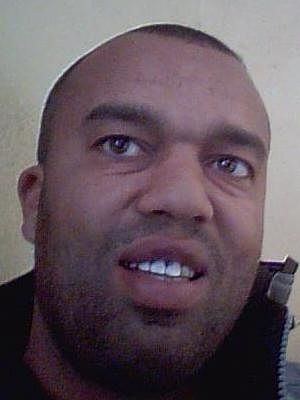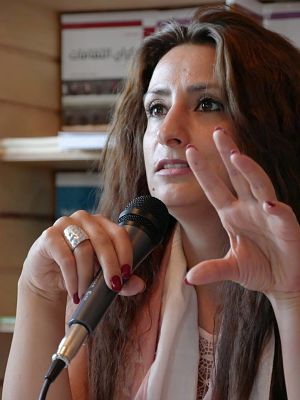Soldiers Are Sleepless Prey & Love is Blue Bruises on the Body
[translated poetry]
Soldiers Are Sleepless Prey
Do the coarse fingers
of soldiers who are fighting wars
touch their children’s soft hands?
Did they ever know tenderness?
Were soldiers who are fighting wars
born soft-skinned babies
with a refined laughter?
Did their mothers bathe them
with hot water and laurel soap
and smilingly comb their hair?
Did they play with their fathers
the game of war and the soldier who defends his country?
Did they jump in their laps
like innocent puppies
and slept from exhaustion?
Did soldiers who hold guns
and drop barrels from planes
on residential quarters, parks, and hospitals,
and bomb day and night, raising the sign
of victory after each massacre
see the scarlet sunset of those villages?
Were they teenagers and adolescents?
Did they walk in the streets of those cities
and flirt with their girlfriends in the narrow alleys,
stealing a small kiss?
Didn’t they wait for their lovers
in front of the doors of schools and parks
carrying in their hands a red rose and a love letter?
—Soldiers who shout “death…death…death to the enemies.”
—The enemy who was a friend of yesterday:
A friend at work,
a friend from childhood,
a friend from school days.
The enemy who was the beautiful girl next door.
The enemy with whom you once shed tears because of oppression
and slept on his shoulder in the school bus.
Will soldiers who are fighting wars
which they won’t remember
grow up one day
and become lonely elderly people
shedding a big tear called
remorse?
Love is Blue Bruises on the Body
As if I were Aleppo
many men loved me
and awaited me in sandy and asphaltic streets.
They set up traps of seduction for me.
They anointed their bodies with the scent of the runaway gazelle.
They smashed my mirrors and threw them at the soldiers’ feet.
I was not as beautiful as Aleppo; the cause of war.
I was a lonely woman
walking under the cherry trees every spring.
Her wheaten skin washed with tears
resembled the first dawn on earth.
A lonely woman
who is loved by many men,
but she is rather preoccupied with
erasing the trace of the war scar from Aleppo’s name.
Many men loved me
like any old quarter of Aleppo,
like a quarter whose heart is monitored by seven locks.
The first door is skipped
by the one who carries his mother on his back
when he left Aleppo heartbroken.
The second door is skipped
by the one who loves cats and smiles at them
when they sadly meow in the abandoned streets of Aleppo.
The third door is skipped
by the one who cries because the exile has not
the smell of his hometown.
The fourth door is skipped
by the one who begets children
and gives them the names of his ex-lovers.
The fifth door is skipped
by the one whose heart knows remorse like children.
The sixth door is skipped
by the one who forgets everything in his old age
but remembers the name of Aleppo.
The seventh door is skipped
by the one who utters my name with familiarity
as if it were his only house.
As if I were Aleppo
many men loved me.
They harshly hugged me as if I were the scent of their country
which they left against their will.
They hurt me and hung my heart on the top
of the minaret of the Umayyad Mosque.
They tortured my heart
as if it were a bird in the trap of the soldiers who destroyed Aleppo.
They plucked its colorful feathers and laughed.
They tore its throat with which it sang poems for them and cried.
They pricked its eyes with thorns and cried out of pain.
They dressed its wounds and felt regret.
But whenever they saw it alive,
they carved their names on it with their sharp knives
like the inhabitants of Aleppo did with its walls
when they were forced to leave it.
The men who loved me
used to leave the traces of their small brutal bites under my armpit
as if they were soldiers.
They were filling my body with blue bruises
and singing to my pitiful cry:
“Blue bruises on the body is love.”
I forsook men;
the handsome,
the cruel,
the liars,
the honest,
the prophets,
the base,
the dirty,
the faithful.
I remained a lonely woman
who drank from the water of Aleppo
which teaches its women to forsake their water servers
because the cherry tree in the forest of her heart
gives cherries pungent with the water of their love.
A woman whose tree doesn’t give sweet cherries,
making the female lover shout the statement:
“I want you like a house in Aleppo.”
A lonely woman;
when asked about love after each wound,
she replied tenderly:
“Love is blue bruises on the body
as if it were Aleppo’s body in the war.”
![]()
الجنود طرائد لا تنام
الجنود الذين يخوضونَ الحروب
هل لمست أصابعهم الخشِنة
رقّة أيدي أطفالهم
هل عرفوا الحنان يوماً
الجنود
الذين يخوضونَ الحروب
هل ولدوا أطفالاً صغاراً
ببشراتٍ ناعمة وضحكة رهيفة
هل حمّمتهم أمهاتهم
بالماء الساخن وصابون الغار
ومشطت شعرهم مبتسمة
هل لعبوا مع آبائهم
لعبة الحرب والجندي الذي يدافع عن بلاده
هل قفزوا بأحضانهم
كجراءٍ صغيرة وبريئة
وناموا من التعبِ
الجنود
الذين يحملونَ البنادق
الجنود الذين يضغطون
على أزرار الطائرة
لترمي البراميل على الأحياء السكنية
والحدائق والمشافي الجنود
الذين يقصفونَ ليل نهار رافعين شارة
النصر
بعد كلّ مجزرة
هل شاهدوا يوماً
الغروب القُرمزي لتلك القرى
هل كانوا مراهقين وشباباً
مشوا بشوارع تلك المدن
وغازلوا صديقاتهم بأزّقتها الضيقة
مختلسين قبلة صغيرة
ألم ينتظروا حبيباتهم أمام
أبواب المدارس والحدائق
حاملين بيدهم وردة حمراء
ورسالة حب.
الجنود
الذين يرددونَ
الموت.. الموت.. الموت للأعداء
العدو الذي كان صديق الأمس
صديق العمل
صديق الطفولة
صديق الدراسة
العدو… بنت الجيران الجميلة
العدو من بكيت معه مرّة من القهر
ونمتَ على كتفهِ في الباص المدرسي
الجنود
الذين يخوضون الحروب
بلا ذاكرة
هل سيكبرون يوماً
يصبحونَ عجائز وحيدين
تسقطُ منهم دمعة كبيرة
تُدْعى
الندم؟.
الحُبُّ كدماتٌ زرقاء على الجسد
كما لو كنتُ حلب
أحبَّني رجالٌ كثر
وترصّدوا خُطاي على الطرقاتِ الترابية والإسفلتية
نصبوا لي فخاخ الغواية
دهنوا رائحة الغزال الطريد على أجسادهم
كسروا مراياي ورموها تحت أقدام الجنود
وأنا لم أكن جميلة كـ”حلب” التي دارت بسببها الحرب
امرأة وحيدة كنتُ
تمشي تحت أشجار الكرز كل ربيع
فتشبه ببشرتها الحنطية المغسولة بالدموع
كأول فجرٍ بزغ على الأرض
امرأة وحيدة
يحبها رجال كثر
فيما هي منشغلة عنهم
بمحو أثر ندبة الحرب حول اسم حلب.
أحبَّني رجالٌ كثر..
كأيَّ حي قديم من أحياء حلب
كحي قلبه مرصودٌ بسبعة أقفالٍ
الباب الأول
يتخطاهُ من حمل أمه على ظهرهِ حينما خرج من حلب منكسرًا
الباب الثاني
يتخطاهُ من يحب القطط ويبتسم لها
حينما تموء بحزن في شوارع حلب المهجورة من سكانها
الباب الثالث
يتخطاهُ من يبكي لأن المنفى ليست
له رائحة مسقط رأسه
الباب الرابع
يتخطاهُ من ينجب أطفالًا ويطلق عليهم
أسماء حبيباته السابقات
الباب الخامس
يتخطاهُ من يعرف قلبه الندم كالأطفال
الباب السادس
يتخطاهُ من ينسى كل شيء في شيخوخته
ويتذكر اسم حلب
الباب السابع
يتخطاهُ من ينطقُ اسمي بألفةٍ كما لو كان بيتهُ الوحيد..
كما لو كنتُ حلب
أحبَّني رجالٌ كثر
ضموني بقسوةٍ كما لو كنتُ رائحة بلادهم
التي هُجِروا منها مرغمين
جرحوني وعلقوا قلبي في أعلى مئذنة الجامع الأموي
عذبوا قلبي
كما لو كان طائرًا في مصيدة الجنود الذين دمروا حلب
نتفوا ريشهُ الملون وضحكوا
مزقوا حنجرته التي غنى بها القصائد لهم وبكوا
غرسوا الشوك في عينه وصرخوا من شدةِ الألم
ضمدوا جراحه وندموا
لكنهم كلما شاهدوه حيًا لا يموت
حفروا بسكاكينهم الحادة أسماءهم عليه
كما فعل سكان حلب مع جدرانها حينما رُحِلوا منها
الرجال الذين أحبوني
كانوا يتركون آثار عضاتهم الصغيرة
تحت إبطي بوحشيةٍ كما لو كانوا جنودًا
كانوا يملؤون جسدي بالكدماتِ الزرقاء
ويغنون للأسى الذي في صرختي:
“الكدماتُ الزرقاء على الجسدِ هي الحُب”
الرجال
الجميلون
القساة
الكاذبون
الصادقون
الأنبياء
الساقطون
الموحلون
المخلصون
هجرتُهم وبقيتُ
امرأة وحيدة شربت من ماء حلب
التي تُعلمُ نساءها التخلي عن سُقاتِها
لأن شجرة الكرز في غابة قلبها
تثمرُ كرزًا حامضًا بماء حبهم
امرأة
لم تثمر شجرتها كرزًا حلوًا المرة
تجعلُ العاشقة فيها تهتفُ بعبارة “أريدكَ كبيتٍ في حلب”
امرأة وحيدة
إذ سألوها بعد كل جرحٍ
ما هو الحب..؟!
أجابتهم بحنانٍ:
الحب كدماتٌ زرقاءٌ على الجسد
كما لو كان جسد حلب في الحرب.
Translator’s Note:
Translating poetry seems at first glance an easy task, but, in reality, involves a lot of getting lost and stuck in the mud and falling into pitfalls. Translating Arabic to English is very challenging because there are fundamental grammatical differences between both languages that necessitate careful attention.
The language of Widad Nabi is simple and straightforward and at the same time pregnant with deep levels of meaning. Her poetry relies on narration and description to convey the pain of memory, trying to gather the bits and fragments of a destroyed country. Nabi’s fascination with description and details is palpable throughout the body of her poems. Nabi believes in the power and significance of details to grant the poem wider abilities to investigate the data stored in her brain, letting her explore the places and things left behind in her homeland. The aggregate of details becomes a good vessel to capture ideas, images, or an entire experience of destruction.
In translating these poems, I have tried my best to retain their vividness and apparent simplicity, and to preserve the beauty of nostalgia and sadness that results from the poet portraying all those tragic events, especially the accumulated bits which are gathered from the flow of war experience.
This is a humble attempt to present, in the English language, the wondrous complexity of Nabi’s poetry, which is characterized by fragmented syntax and, at times, longer lines, questions, and definitions. I tried to replicate her intense search for new meanings as her poems delve into nostalgic elements, without forgetting the here-and-now of the new world she lives in and her desire to engage readers with questions about what it means to be a human being in a state of war.
 Ali Znaidi lives in Redeyef, Tunisia. He is the author of several chapbooks, including Experimental Ruminations (Fowlpox Press, 2012), Moon’s Cloth Embroidered with Poems (Origami Poems Project, 2012), Bye, Donna Summer! (Fowlpox Press, 2014), Taste of the Edge (Kind of a Hurricane Press, 2014), and Mathemaku x5 (Spacecraft Press, 2015). For more, visit aliznaidi.blogspot.
Ali Znaidi lives in Redeyef, Tunisia. He is the author of several chapbooks, including Experimental Ruminations (Fowlpox Press, 2012), Moon’s Cloth Embroidered with Poems (Origami Poems Project, 2012), Bye, Donna Summer! (Fowlpox Press, 2014), Taste of the Edge (Kind of a Hurricane Press, 2014), and Mathemaku x5 (Spacecraft Press, 2015). For more, visit aliznaidi.blogspot.

 Widad Nabi is a Syrian poet of Kurdish origin, who currently lives in Germany. She was born in Kobani in 1985. She graduated with a Bachelor’s degree in economics from the University of Aleppo. She has published poems in numerous Arab literary magazines. She is the author of two poetry collections, A Midday of Love… A Midday of War, and Death As If It Were Junk.
Widad Nabi is a Syrian poet of Kurdish origin, who currently lives in Germany. She was born in Kobani in 1985. She graduated with a Bachelor’s degree in economics from the University of Aleppo. She has published poems in numerous Arab literary magazines. She is the author of two poetry collections, A Midday of Love… A Midday of War, and Death As If It Were Junk.


